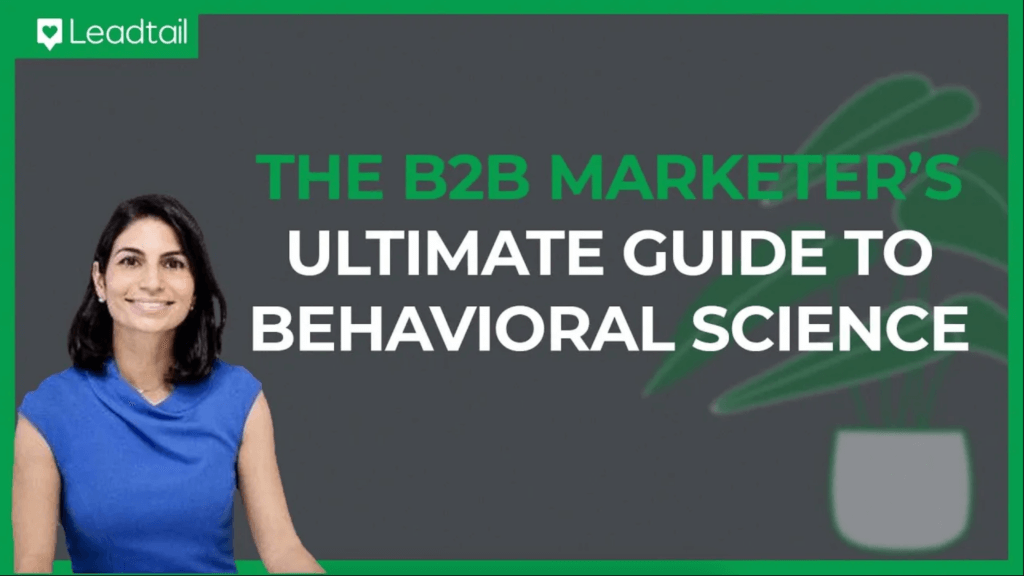All B2B marketers are looking for one thing: a decision. The art of marketing is helping decision-makers understand the features and benefits of our products and services to make an informed decision that launches a long-term relationship.
For all of the data available to B2B marketers, we are often in the dark about what drives human decisions. And that’s where behavioral science can help. Behavioral science augments marketing by providing valuable insights into human decision-making.
Shirin Oreizy, Founder and CEO of Next Step, shares her insights on applying behavioral science in B2B marketing with the Leadtail community.
Shirin, who started her career as an engineer before transitioning into marketing, emphasizes the importance of understanding human decision-making in marketing strategies. “I think we’re all probably as marketers well qualified as behavioral scientists because we deal with humans and human decision-making,” she says.
The Science Behind Choices
Behavioral science delves into the intricacies of human decision-making, shedding light on the cognitive biases, heuristics, and social influences that shape our choices.
But Shirin says most businesses don’t consider these elements as they plan marketing initiatives. “With most of our clients, there’s this kind of lack of clarity around what their users or prospects’ real motivations and decision making is.”
By applying behavioral science principles to B2B marketing, organizations gain a deeper understanding of their customers’ decision-making processes.
“Behavioral Science is the study of how people really make decisions,” Shirin says. “And we kind of put that emphasis on the word ‘really’ because we’re taking into account things like people’s emotions, how an environment is designed, whether it’s digital or physical, social factors, all of these other factors that influence us as humans.”
Behavioral scientists help identify the psychological factors influencing purchase decisions, such as loss aversion, social proof, and the anchoring effect. With this insight, marketers can craft targeted messaging and campaigns that resonate with audiences by addressing their needs and concerns more effectively.
Mr. Spock or Homer Simpson?
One of the fundamental principles of behavioral science is understanding that humans are not always rational in their decision-making. To illustrate this, Shirin compares two pop culture icons: Star Trek’s Mr. Spock and the lovable cartoon oaf Homer Simpson.
“It’s a natural tendency we have to think of our users as perfect like Spock,” she says. “They’re perfectly rational, and if I simply give them more information about our solution and more choices in our product—Spock is a decision optimizer; he’ll figure it out, and he’ll choose us.”
But the reality of human decision-making isn’t as cut and dried.
“As behavioral scientists, we think of the prospect or the user lovingly a little bit more like Homer Simpson. We all are faced with 35,000 decisions per day. We’re not running around making these decisions consciously. We have biases and mental shortcuts and heuristics that really are involved in how we make decisions.”
Emotions Matter
Understanding human behavior when it comes to choices has significant implications for marketing strategies. For instance, marketers often believe providing more information will lead to better customer decision-making. However, Shirin argues, “Content is good, people do need to get informed, but it’s really important that we understand their context.”
Understanding context means getting a read on the emotional aspects of decision-making. Shirin explains that it also involves understanding the consumer’s perspective on risk and gain.
“As humans, we tend to feel losses about twice as much as gains,” she says. “So think of it this way, losing a hundred bucks out of your pocket walking down the street is about twice as painful as finding a hundred bucks.”
Assumptions vs. Science
Failing to appreciate that human decision-making is only sometimes based on reason and logic can lead to several false assumptions in B2B marketing. “Traditional” marketing efforts are frequently characterized by:
- A desire to demonstrate expertise. This approach means using industry jargon and insider language to illustrate the brand’s status as a thought leader and authority.
- A focus on delivering content. Often, brands will create and publish large amounts of content in an effort to educate potential customers. The assumption is that if the customer has enough information, they can make the optimal decision.
- An expectation of trust. It’s natural to assume that if we have demonstrated our expertise and authority and provided plenty of informative content, potential customers should feel comfortable trusting us with their business.
- Trial and error. Traditional marketing is often rooted in data, but that data can discount context, making it difficult to understand why some things work and others don’t.
In contrast, behavioral science can inform a marketing strategy that:
- Makes the customer feel like an expert. This means taking the time to understand their needs and what outside factors may influence their decisions.
- Understands the customer context. Rather than providing more content and information, this approach focuses on listening and emotional intelligence.
- Mitigates risk. When marketers understand the context and emotional factors that play into the decision-making process, they can provide answers that help customers feel safe as they make decisions.
- Deploys the scientific method. Marketers who take this approach begin with research-backed theories of human decision-making and run tests that yield actionable insights.
Behavioral science offers a transformative approach to B2B marketing, enabling organizations to understand their customers better, personalize their strategies, and work with the natural decision-making process.
By integrating behavioral science principles into their efforts, B2B marketers can gain a competitive edge, forge deeper connections, and drive sustainable growth in the ever-evolving B2B landscape.
Get more insights on how behavioral science can inform a successful marketing strategy when you watch Shirin’s presentation on Leadtail TV.
Ready to get started with social media marketing? Let’s chat!
